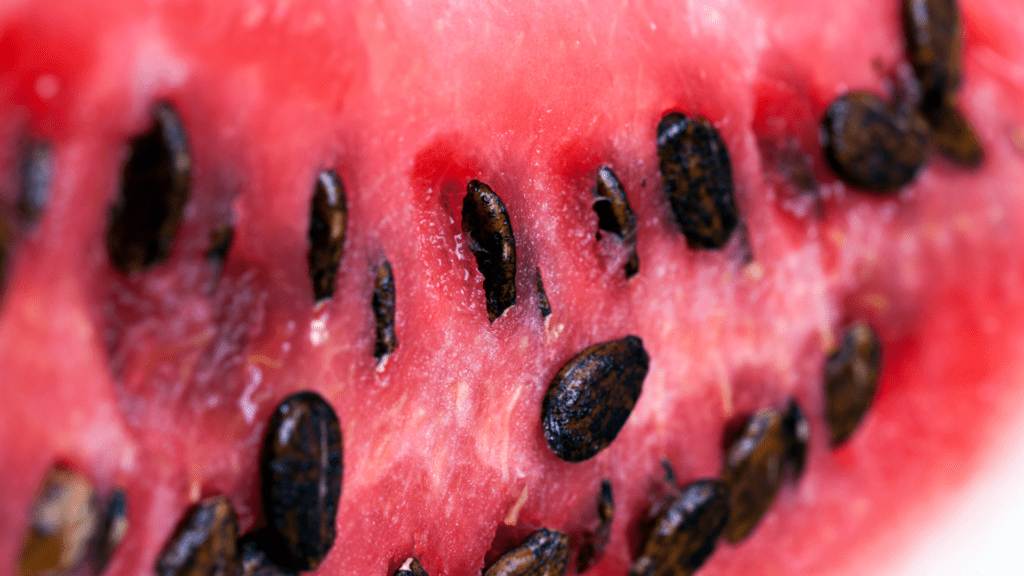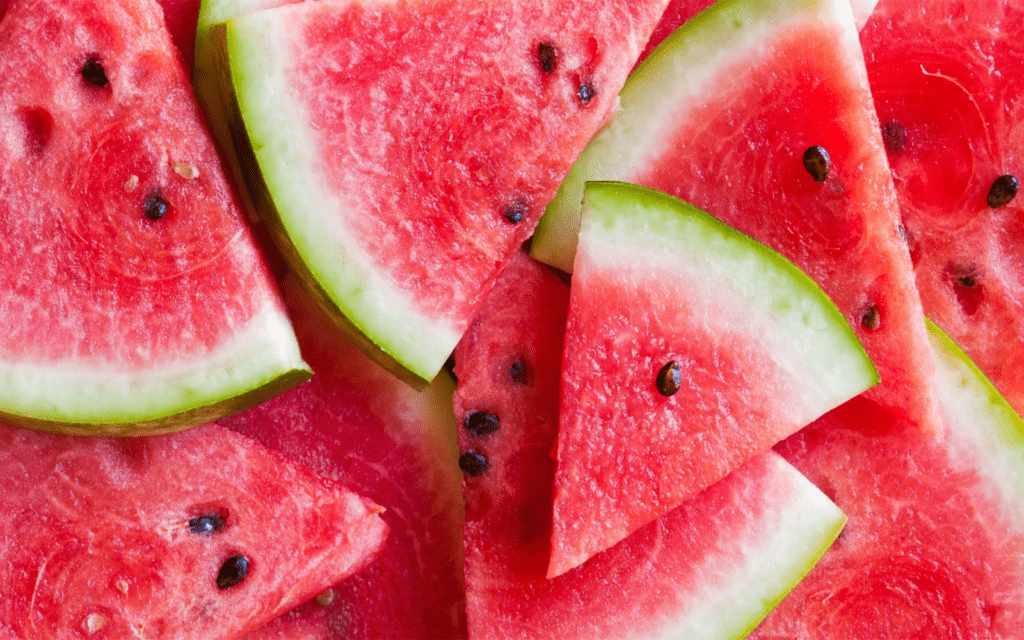Introduction
Watermelon, widely celebrated as the quintessential summer fruit for its refreshing taste and invigorating nature, is not only a seasonal delight but also a treasure trove of essential nutrients. However, while most people relish the juicy, pink flesh of the watermelon, the seed of watermelon, typically disregarded, contain a surprising wealth of health benefits that are often overlooked.

Nutritional Powerhouse: The Seed of Watermelon
Often overlooked, watermelon seeds are a nutritional powerhouse, offering a surprising array of essential nutrients. Notably, they are an excellent source of magnesium, iron, zinc, and copper, along with vitamins B1, B2, and B6. Moreover, they contain healthy fats, including monounsaturated and polyunsaturated fatty acids, which are beneficial for cardiovascular health.
Magnesium Powerhouse: Seed of Watermelon as a Rich Source
Magnesium, a crucial mineral for various bodily functions, is abundant in watermelon seeds. It plays a vital role in muscle and nerve function, blood sugar control, and blood pressure regulation. Consuming watermelon seeds can help maintain healthy magnesium levels, contributing to overall well-being.
Iron-Rich Seed of Watermelon- Boosting Hemoglobin Levels
Iron, essential for transporting oxygen throughout the body and preventing anemia, underscores the significance of watermelon seeds as a valuable source of this vital mineral. Furthermore, watermelon seeds stand out as a commendable source of iron, particularly beneficial for individuals grappling with iron deficiency. Regularly incorporating watermelon seeds into your diet can effectively elevate hemoglobin levels, thereby ensuring a consistent and adequate oxygen supply to the body’s tissues.
Additionally, this natural iron-rich source, often overlooked, provides a convenient means to address iron deficiencies without resorting to synthetic supplements. Watermelon seeds present an accessible and nutritious solution, contributing to the restoration of healthy iron levels while supporting overall bodily functions. By integrating these seeds into meals or consuming them as a snack, you can adopt a practical approach to fortifying iron reserves and promoting overall well-being.
A Potential Source of Antioxidants
Antioxidants are compounds that combat harmful free radicals, protecting cells from damage and reducing the risk of chronic diseases. Watermelon seeds contain antioxidants such as flavonoids and lycopene, which may help neutralize free radicals and promote cellular health.
Supporting Heart Health
The combination of magnesium, iron, and healthy fats in watermelon seeds contributes positively to heart health. Magnesium helps regulate blood pressure and blood sugar levels, while iron prevents anemia, both of which are risk factors for cardiovascular diseases. Additionally, healthy fats contribute to healthy cholesterol levels, further supporting heart health.
Enhancing Glycemic Control
Watermelon seeds may have potential benefits for individuals with diabetes or pre-diabetes. They contain fiber, which helps slow down sugar absorption into the bloodstream, promoting better glycemic control. Additionally their magnesium content may help enhance insulin sensitivity, further regulating blood sugar levels.
Aiding in Digestion
The fiber content in watermelon seeds serves as a significant contributor to digestive health. Furthermore, this often-overlooked component plays a pivotal role in promoting regular bowel movements, thereby preventing constipation and enhancing overall gut health. Moreover, the inclusion of fiber in your diet through watermelon seeds not only aids in digestion but also contributes to a feeling of fullness, potentially supporting weight management efforts.
Additionally, the soluble and insoluble fiber present in watermelon seeds work synergistically to maintain bowel regularity and support a healthy digestive system. Consequently, regular consumption of these seeds can effectively contribute to the maintenance of a balanced gastrointestinal tract, ensuring optimal digestive function. By integrating watermelon seeds into your diet, you can conveniently and naturally harness the benefits of fiber, promoting not only digestive wellness but also overall health and well-being.
Seed of Watermelon: Promoting Hair and Skin Health
Moreover, the synergistic blend of zinc and vitamin E found in watermelon seeds can significantly benefit hair and skin health. Zinc, crucial for hair follicle health, aids in cell reproduction, tissue growth, and repair, playing a vital role in promoting robust hair growth and preventing hair loss.
Additionally, vitamin E’s antioxidant prowess is remarkable for skin health. Its protective properties defend against free radicals, reducing oxidative stress and safeguarding skin cells from damage caused by environmental factors. The incorporation of watermelon seeds into your diet not only nurtures healthy hair growth but also enhances skin texture, contributing to a radiant and vibrant complexion.
Through regular consumption or inclusion of watermelon seeds in your meals, you can obtain a natural source of these essential nutrients, fostering the maintenance and revitalization of both hair and skin.

Seed of Watermelon: Potentially Enhancing Sleep
Magnesium, abundant in watermelon seeds, may have potential benefits for sleep. It helps regulate the nervous system, promoting relaxation and reducing stress, which can contribute to better sleep quality. Furthermore, magnesium may help regulate melatonin production, a hormone that plays a crucial role in sleep cycles
Also Read:
Nutrition in Watermelon – Calories in Watermelon
Watermelon Rind is Not a Waste | The Secret Superfood
Seed of Watermelon: A Sustainable Snack Option
Watermelon seeds present an excellent and sustainable snack option. Additionally, they offer a smart utilization of a byproduct from watermelon production that would otherwise be discarded. The seeds, often overlooked or discarded, possess valuable nutritional benefits. By consuming them as a snack, you not only reduce waste but also tap into a rich source of nutrients that contribute to your overall well-being.
Moreover, this eco-friendly approach aligns with sustainable practices, as it minimizes food waste while offering a nutritious alternative to conventional snacks. Embracing watermelon seeds as a snack choice not only benefits your health but also promotes environmentally conscious habits by utilizing the entirety of this fruit.
Easy Ways to Incorporate Seed of Watermelon into Your Diet
Moreover, incorporating watermelon seeds into your diet is simple and convenient. You can consume them raw, roasted, or ground into a powder. Here are some easy ways to include watermelon seeds in your daily meals:
Roasted Watermelon Seeds:
Spread watermelon seeds on a baking sheet and roast in a preheated oven at 180°C (350°F) for 10-15 minutes, stirring occasionally, until they are slightly browned and crispy. You can add a pinch of salt or your favorite herbs for extra flavor.
Adding to Granola or Trail Mix:
Moreover, incorporate roasted watermelon seeds into your granola or trail mix for a crunchy and nutritious boost. The nutty flavor of the seeds pairs well with the sweetness of dried fruits and nuts.
Sprinkling on Salads, Yogurt, or Soups:
Add a sprinkle of roasted watermelon seeds to salads, yogurt, or soups for an extra crunch and boost of nutrients. The seeds add a unique texture and nutty flavor to these dishes.
Blending into Smoothies or Juices:
Blend watermelon seeds into smoothies or juices for a nutrient-rich boost. The seeds provide a good source of fiber, which can help you feel fuller for longer.
Making Watermelon Seed Butter:
Grind watermelon seeds into a fine powder and add a touch of oil or honey to create a smooth and flavorful watermelon seed butter. This can be used as a spread for toast, crackers, or fruit.
Culinary Creativity: Seed of Watermelon as a Versatile Ingredient

Additionally, watermelon seeds can be used as a versatile ingredient in various culinary creations. Their nutty flavor and crunchy texture add a unique twist to sweet and savory dishes. Here are some ideas for using watermelon seeds in your kitchen:
Infused Oils and Vinegars:
Infusing watermelon seeds in oils or vinegars presents a delightful opportunity to enhance flavors in your culinary explorations. Their subtle nuttiness, paired with a hint of earthiness, imparts a distinctive taste profile, ideal for elevating various dishes. When soaked in oils or vinegars, these seeds gradually release their essence, transforming ordinary dressings, marinades, or drizzles into extraordinary flavor enhancers.
To infuse, simply add a handful of watermelon seeds to a bottle of your preferred oil or vinegar. Subsequently, allow the mixture to sit for several days or weeks, depending on your desired intensity. During this time, as the seeds steep, the liquid gradually absorbs their essence, creating a nuanced flavor infusion. Afterward, experiment by incorporating this unique blend into salads, roasted vegetables, or as a finishing touch over grilled meats or seafood.
This infusion technique not only adds complexity to your culinary repertoire but also introduces an innovative way to embrace the nutritional benefits of watermelon seeds within your daily meals.
Watermelon Seed Flour:
Grind watermelon seeds into flour and use it in baking cakes, cookies, or bread. The flour adds a unique flavor and texture to these baked goods.
Watermelon Seed Pesto:
Create a flavorful watermelon seed pesto by combining roasted watermelon seeds, garlic, basil, olive oil, and Parmesan cheese. This pesto can be tossed with pasta, spread on sandwiches, or used as a dipping sauce for vegetables.
Watermelon Seed Toppings:
Use watermelon seeds as a topping for ice cream, sorbet, or yogurt. The seeds add a crunchy and nutty texture that complements the sweetness of these desserts.
Considerations and Precautions
While watermelon seeds offer a range of health benefits, it’s essential to consume them in moderation. Overconsumption may lead to digestive discomfort due to their high fiber content. Additionally, individuals with certain allergies or sensitivities to watermelon should exercise caution when consuming watermelon seeds.
Conclusion:
Often overlooked and discarded, watermelon seeds are a treasure trove of nutrients and potential health benefits. They are a rich source of magnesium, iron, zinc, and healthy fats, along with antioxidants, vitamins, and fiber. Incorporating watermelon seeds into your diet can contribute to overall well-being, supporting heart health, glycemic control, digestion, and hair and skin health. Additionally, watermelon seeds are a sustainable snack option and a versatile ingredient in various culinary creations. Embrace the seed of watermelon and discover its hidden health benefits for a healthier and more vibrant you.
References
- USDA National Nutrient Database for Standard Reference: Seeds, watermelon seed kernels, dried
- The 5 Best Watermelon Seed Benefits – Healthline
- Health Benefits of Watermelon – Cleveland Clinic
- The Health Benefits of Watermelon: Nutrition, Facts, Safety.
- 12 Magical Health Benefits Of Watermelon Seeds

